Wildflowers, Grasses and Other Nonwoody Plants
Media
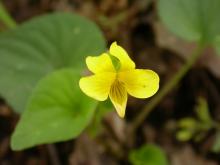
Species Types
Scientific Name
Viola pubescens (formerly V. pensylvanica)
Description
The yellow violet is Missouri's only all-yellow violet. This native wildflower is less common than violet violets. Look for it in low woods, rich slopes, and wooded floodplains.
Media
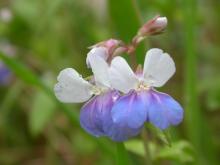
Species Types
Scientific Name
Collinsia verna
Description
The flowers of blue-eyed Mary are only about a half inch wide, but this pretty wildflower makes up for it by usually appearing in abundance, covering a patch of forest floor with little sky-blue and white “faces.”
Media
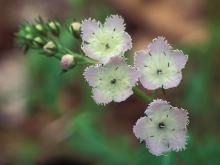
Species Types
Scientific Name
Phacelia purshii
Description
An annual, spring-blooming wildflower, Miami mist has loose coils of small blue flowers with distinctive, delicate fringes on the petal lobes.
Media
Species Types
Scientific Name
Vernonia baldwinii
Description
Ironweeds are tough, grayish-green, branching plants known for their fluffy-looking clusters of reddish-purple florets. They are a familiar sight on roadsides and pastures. Identify western ironweed by the bracts at the base of the flowerheads.
Media

Species Types
Scientific Name
Silene virginica
Description
Fire pink is a low, clump-forming perennial with many slender, spreading stems that are sticky from glandular hairs, with open clusters of bright red flowers. This showy native Missouri plant is growing in popularity among home gardeners.
Media
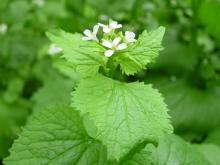
Species Types
Scientific Name
Alliaria petiolata
Description
Because each plant disperses a large number of seeds, garlic mustard can outcompete native vegetation for light, moisture, nutrients, soil, and space as it quickly colonizes an area.
Media

Species Types
Scientific Name
Echinacea simulata
Description
One of Missouri’s five types of echinaceas, glade coneflower is distinguished by its yellow pollen, drooping pink or purple ray flowers, and narrow, tapering leaves. Look for it in the eastern Ozarks, and at native plant nurseries!
Media
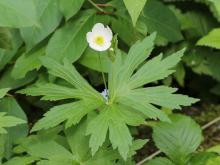
Species Types
Scientific Name
Anemone canadensis
Description
White anemone is a showy native wildflower with interesting, deeply toothed leaves. Often occurring in colonies, it spreads easily (even aggressively) from rhizomes and is sometimes cultivated in wildflower gardens.
Media

Species Types
Scientific Name
Camassia scilloides
Description
In spring, wild hyacinth bears an elongated cluster of pale blue flowers with prominent anthers that sway on stalks up to 2 feet tall.
Media

Species Types
Scientific Name
Centaurea stoebe
Description
Spotted knapweed is an invasive plant that outcompetes native communities, takes over pastureland, and even beats back invasive sericea lespedeza! It has arrived in our state. Let’s prevent its spread.
See Also
About Wildflowers, Grasses and Other Nonwoody Plants in Missouri
A very simple way of thinking about the green world is to divide the vascular plants into two groups: woody and nonwoody (or herbaceous). But this is an artificial division; many plant families include some species that are woody and some that are not. The diversity of nonwoody vascular plants is staggering! Think of all the ferns, grasses, sedges, lilies, peas, sunflowers, nightshades, milkweeds, mustards, mints, and mallows — weeds and wildflowers — and many more!





















